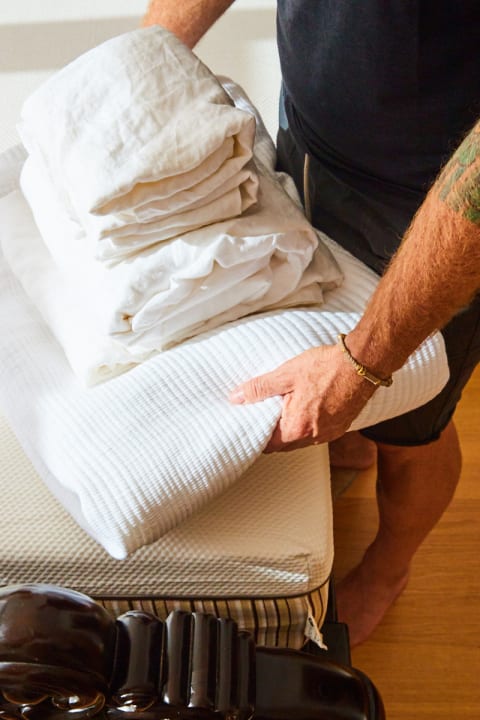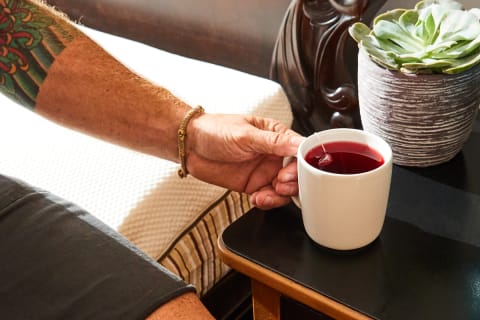Advertisement
What This Top Chef Eats—And Avoids—To Get A Great Night's Sleep

As a chef, restaurant owner, cookbook author, and avid cyclist I am constantly on the go. Through it all, I’ve learned that a good night’s rest goes a long way!
Setting up for a great sleep is a two-step process. First, I need to make sure my environment is as comfortable and relaxing as possible. I try to avoid phones, computers, and TVs at least two hours before bed. I’ve also prioritized quality mattresses and pillows. We spend so much time analyzing what we put into our bodies, and we need to do the same with the products we surround ourselves with.

Essentia makes the world’s only natural memory foam, made with hevea milk, organic essential oils, natural plant extracts and water. In addition to being made with clean materials, the mattress gives great support to my back—which is necessary for my active lifestyle. The natural materials ensure your body’s central nervous system is able to spend less time fighting outside elements and more time recovering from the daily grind. I love how my Essentia mattress makes every night something to look forward to!
Then I look inward to prepare my body to get the most out of my nightly z’s. Working with food every day means I’ve discovered first-hand the countless ways that food affects me. What I eat before bed can make or break how I feel when I wake up. Here’s what I eat and, more importantly, what I don’t, for a great night’s sleep.
What To Enjoy:
1. Ginger

Ginger is an amazing ingredient with numerous properties to help you achieve a restful night’s sleep. Steeping some ginger in hot water and drinking before bed improves digestion, calms any nausea, and promotes muscle relaxation. Not to mention, it tastes great!
2. Mint
Mint is a great stress reliever and relaxant. Having a cup of peppermint tea will not only ease your mind, but the menthol in the herb will also serve as a muscle relaxant.
3. Raw honey
While I don’t condone sugar, having a spoonful of raw honey before bed (whether alone or in your tea) has been proven to improve sleep. Your liver works hard all night and needs a substance called glycogen to function properly, and raw honey has enough glycogen to sustain a full eight hours of sleep.
4. Cherries
Cherries may not be the first food that comes to mind when you think of a good night’s rest, but these tart little fruits contain melatonin, a chemical shown to drastically help regulating sleep patterns.
5. Avocados

Avocados are a great source of magnesium, which has been shown to improve quality of sleep and calm stress. Having a bit in the evening will be sure to help you relax before bed.
6. Bananas
If you need a late-night snack, bananas are a great option. They are easily and quickly digested and, like avocados, are a good source of magnesium. Plus, they are high in potassium, which is great for muscle recovery.
Believe it or not, I often opt for slightly unripe bananas. The extra starch helps feed healthy bacteria in the gut to promote baseline health.
Bonus: Seamus’ elixir

Many of us keep a glass of water by our beds, but I add a few special ingredients to take mine to the next level. If I’ve had a particularly long day, I’ll drink a tall glass of water with couple drops of passionflower extract (a mild, natural sedative) and magnesium powder, which helps muscles relax and recover.
What To Avoid:
1. Caffeine
That after-dinner coffee lingers in your system longer than you realize. It can actually take up to 5 hours for caffeine to leave your system. While it may seem obvious not to knock back an expresso before bed, caffeine can sneak into your diet in other ways besides coffee, such as dark chocolate.
2. Sugar
Sugar, like caffeine, is a stimulant, and eating sweets before bed can cause you to toss and turn. This will prevent you from falling into the deep sleep you need to wake up feeling well-rested. Instead, more likely than not, you’ll wake up feeling groggy and tired.
3. Spicy Foods
Fiery, acidic foods disrupt sleep because they can cause heartburn or indigestion. When enjoying these foods, have them at least three hours before bed to give yourself time to digest.
4. Alcohol
A nightcap to end your evening may help you fall asleep quickly, but it will severely impact your quality of sleep. It prevents the kind of deep sleep you need to feel well-rested in the morning.
Bonus Tip: Add a ritual

As we know, your bedroom and mattress have a huge impact on your sleeping patterns. Bedtime rituals and routines are a great way to settle into your sleep space, and can help your mind and body get ready to relax and recharge. Whether it is reading a book in bed, listening to music, or simply a glass of water these pre-sleep rituals help reduce any anxieties built up throughout the day, and remind us (and our bodies) that it is time to settle in for a great night’s sleep.
